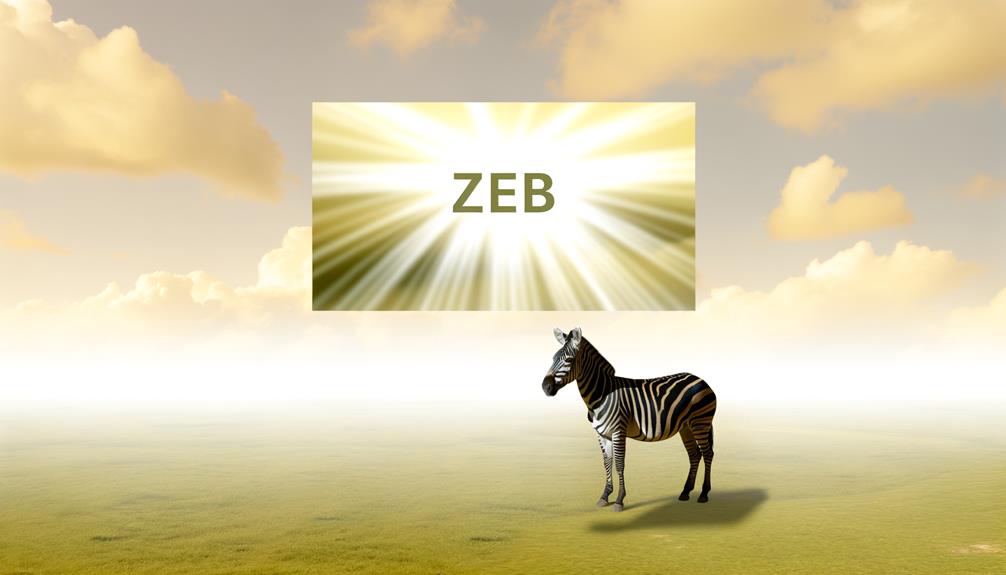Meaning of the Name Zeb
The name Zeb derives from the Hebrew name Zebulon, which translates to 'dwelling' or 'habitation.' Historically, Zebulon is one of Jacob's twelve sons and held significant importance within the Tribe of Zebulon, a key player in ancient Israelite society. The name retains its foundational meaning while adapting to various linguistic and cultural contexts, featuring diminutives like Zebediah and Zebedee.
Over time, Zeb's popularity has fluctuated, peaking during biblical and colonial periods and witnessing a resurgence in modern niche communities. Interested individuals will find Zeb's deep historical and cultural significance particularly enlightening.

Key Takeaways
- Zeb originates from the Hebrew name Zebulon, meaning 'dwelling' or 'habitation.'
- Zebulon was one of Jacob's twelve sons and a significant biblical figure.
- The name Zeb symbolizes perseverance and communal contribution.
- Zeb has variations like Zebediah, Zebedee, and Zabulon.
- Zeb's popularity has fluctuated but remains present in niche communities.
Origins of the Name Zeb
The name Zeb is believed to have its origins in the Hebrew name Zebulon, which appears in ancient biblical texts. Rooted in the Hebrew language, Zebulon translates to 'dwelling' or 'habitation,' reflecting its historical and cultural significance.
The abbreviated form, Zeb, has evolved over centuries, adapting to various linguistic and cultural contexts while retaining its foundational meaning. This etymological lineage underscores the name's enduring nature, linking contemporary usage to its ancient roots.
Scholars often examine such names to understand cultural transmissions and changes in linguistic patterns over time. The name Zeb, thus, serves as a fascinating study in how names can traverse through history, maintaining their essence while adapting to new environments and languages.
Biblical References
Biblical texts mention Zebulon as one of the twelve sons of Jacob, whose descendants formed the Tribe of Zebulon, playing a significant role in the historical and religious landscape of ancient Israel. Zebulon is first introduced in Genesis 30:20, where he is born to Leah, Jacob's first wife.
Subsequent mentions in Numbers 1:30-31 highlight the tribe's numerical strength during the census in the wilderness. The tribe's territory, delineated in Joshua 19:10-16, was strategically located between the Mediterranean Sea and the Sea of Galilee, facilitating trade and military movements.
Zebulon's inclusion in the blessings of Jacob (Genesis 49:13) and Moses (Deuteronomy 33:18-19) underscores its importance. These references collectively contribute to understanding Zeb's deep biblical roots.
Cultural Significance
Zebulon's cultural significance extends beyond its biblical origins, permeating various aspects of historical and contemporary Jewish identity and traditions. The Tribe of Zebulon, one of the twelve tribes of Israel, held notable importance in ancient Israelite culture, including maritime commerce and regional defense. This significance is reflected in various cultural artifacts and rituals observed within Jewish communities.
| Aspect | Cultural Impact |
|---|---|
| Ancient Commerce | Facilitated trade and economic stability |
| Regional Defense | Provided military support and territorial protection |
| Jewish Rituals | Referenced in prayers and religious ceremonies |
| Historical Artifacts | Found in archaeological discoveries and literature |
| Contemporary Identity | Symbolizes perseverance and communal contribution |
This multifaceted cultural legacy continues to imbue the name Zeb with profound resonance in Jewish tradition.
Variations and Nicknames
While Zebulon's rich cultural significance is well-documented, the name also possesses a variety of linguistic forms and affectionate diminutives that reflect its adaptability and enduring appeal across different contexts.
Commonly shortened to Zeb, this diminutive conveys familiarity while maintaining the name's distinctive charm. Variations such as Zebediah and Zebedee offer extended forms that preserve the core phonetic elements while adding a unique twist.
In different linguistic landscapes, Zebulon may transform into forms like Zabulon or Zebulun, showcasing its versatility. These variations and nicknames not only simplify pronunciation but also enhance personal connection.
Each iteration, whether formal or colloquial, underscores the name's ability to traverse cultural and social boundaries seamlessly, illustrating its timeless relevance.
Popularity Over Time
Tracing the popularity of the name Zeb over time reveals a nuanced trajectory shaped by historical, cultural, and social influences. In earlier centuries, Zeb was more common, often linked to biblical contexts or colonial America, reflecting its roots in religious and pioneer traditions.
However, as societal norms evolved, the name's prevalence declined, making it a rarer choice in the contemporary era. Data from national birth registries and census records indicate sporadic usage, peaking occasionally due to regional preferences or notable figures in local history.
Despite its diminishment in mainstream use, Zeb has seen a modest resurgence in niche communities valuing unique, vintage names, showcasing the cyclical nature of naming trends influenced by cultural nostalgia and individuality.
Famous People Named Zeb
Examining the prominence of individuals named Zeb reveals a fascinating cross-section of historical figures and modern celebrities.
Notable historical figures such as Zebulon Pike, for whom Pike's Peak is named, highlight the name's longstanding significance.
In contemporary culture, personalities like Zeb Wells, a prominent comic book writer, underscore the name's continued relevance and versatility.
Historical Figures Named Zeb
Zebulon Pike, an American explorer and military officer, stands out as a prominent historical figure named Zeb. Born in 1779, Pike is most renowned for his expeditions in the early 19th century, his exploration of the southern portion of the Louisiana Territory.
Pike's Peak, a well-known summit in Colorado, bears his name, signifying his enduring legacy in American history. His 1806 expedition, often compared to the Lewis and Clark expedition, provided valuable insights into the western territories, despite Pike being captured by Spanish authorities.
Pike's military career also holds significance, as he served during the War of 1812, culminating in his death at the Battle of York. His contributions to exploration and military history remain influential.
Modern Celebrities Named Zeb
While historical figures like Zebulon Pike have left a lasting impact on history, contemporary celebrities named Zeb continue to influence various aspects of present-day culture. These individuals cover a wide range of fields including sports, entertainment, and literature, each bringing a distinctive style to their respective domains.
| Name | Profession | Notable Achievement |
|---|---|---|
| Zeb Noland | Football Player | Shifted from player to coach at a young age. |
| Zeb Wells | Comic Book Writer | Renowned for his work on Marvel's Spider-Man series. |
| Zeb Hogan | Biologist | Lead in the TV series 'Monster Fish' on Nat Geo Wild. |
| Zeb Soanes | Newsreader/Author | Acknowledged for his contributions on BBC Radio 4 and children's literature. |
These contemporary Zeben showcase a vibrant combination of skill and creativity.
Modern-Day Appeal
In contemporary society, the name Zeb has garnered significant attention due to its unique blend of simplicity and distinctiveness, making it appealing to modern parents seeking an unconventional yet classic name.
The brevity of Zeb ensures it is simple to pronounce and remember, while its rarity adds an element of exclusivity. Also, Zeb's historical roots and cultural significance provide a depth that resonates with those valuing heritage. Its versatility across different cultures and languages enhances its global appeal.
Additionally, the name Zeb fits well within current naming trends that favor short, impactful names. As a result, Zeb stands out as a compelling choice in an era increasingly characterized by a desire for individuality and meaningfulness in naming.
Conclusion
The name Zeb, with its deep biblical roots and cultural resonance, has maintained a modest yet consistent presence in various societies.
Notably, the name experienced a significant surge in popularity during the 19th century in the United States, particularly within religious communities. This historical peak underscores the enduring appeal and significance of biblical names in shaping cultural and social identities.
Zeb's continued relevance highlights its versatile charm and timeless allure in modern contexts.






